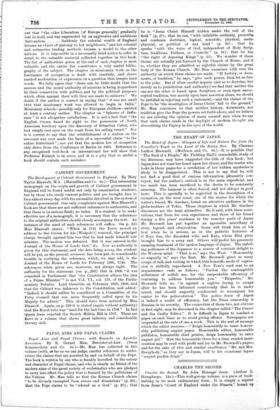CABINET GOVERNMENT.
The Development of Cabinet Government in England. By Mary Taylor Blauvelt, M.A. (Macmillan and Co. 6s.)—This interesting monograph on the origin and growth of Cabinet government in England will be found useful not only by examination students, but by those who study current politics and are brought face to face almost every day with the anomalies involved in the system of Cabinet government. Our only complaints against Miss Blauvelt's book are that there are not sufficient references to authorities, and that there is (a serious fault) no index. If a student is to make effective use of a monograph, it is necessary that the references to the original authorities should closely accompany the text. An instance of the need of such references will suffice. On p. 224 Miss Blauvelt states : " When in 1741 the Peers moved an address to the Crown for his [Walpole's] removal, the principal charge brought against him was that he had made himself sole minister. The motion was defeated. But it was entered in the Journal of the House of Lords that," Sc. Now no authority is given for this statement, and the date being wrong, the student will be put, as the present reviewer has been put, to considerable trouble in verifying the reference, which, we may add, is the Journal of the House of Lords for February 13th, 1740. The references when given are, moreover, not always right. The authority for the statement (on p., 293) that in 1806 "it was remarked in Parliament that the Constitution abhors the idea of a Prime Minister " is not Vol. VI., col. 178, of the Parlia- mentary Debates. Lord Grenville on February 24th, 1806, said that the Cabinet was unknown to the Constitution, and added : " Indeed, it should rather be considered as a Committee of the PAS), Council that was more frequently called upon by his Majesty for advice." This should have been noticed by Miss Blauvelt. Again, on p. 116 it is stated (again without authority) that the Royal veto was "used for the last time in 1706." In fact Queen Anne rejected the Scotch Militia Bill in 1707. These are flaws in a volume that shows great industry and considerable• literary skill.






















































 Previous page
Previous page